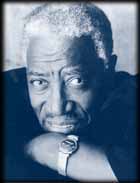
|
|
|
|
|
|
|
Joe Williams
Joe Williamsí rich baritone voice emanates a warmth and vitality that not only uplifts an audience, but inspires accompanying musicians as well. His repertoire intermingles jazz and the blues, with renditions that often capture the complementary essence of both genres. But whether heís singing a passionate ballad, a bebop scat, or some serious blues, the strength of Williamsí performance transcends the question of genre. Introducing himself to the audience at the Kennedy Centerís Terrace Theater, Williams makes a simple promise: "Iím gonna sing some songs". But he delivers much more than that. An engaging, eloquent, and often jovial entertainer, Williams also loves to share a good story--and a hearty laugh. He starts the show off with a steaming hot blues number by Wesley "Socks" Wilson. Williams set a standard for big band singers as a leading vocalist in Count Basieís orchestra during the 1950ís. He reminisces about the uplifting effect the band had on its audiences. Williams quotes a friend who summed it up when she said, "Basie used to come to town and open the windows of our spirit." Williams says that when you are lucky enough to be a part of something with such spiritual power, then "youíre in the right business." At one point, Dr. Taylor appropriately refers to Williams as Count Basieís "Number One Son". Chatting with Billy, Williams remembers the bandís resurgent popularity during the 1950ís. At that time, he was flattered by the support it drew from other famous performers such as Billie Holiday and Sarah Vaughan, who used to frequent Basieís performances at venues like Birdland in New York. Billy points out that Williams got an early start singing "spirituals", having been in a gospel group at age fourteen. Williams was in the Jubilee Boys Choir in Chicagoís South Side, where he grew up. He recalls a rigorous schedule of rehearsing and performing at churches throughout the area. Demonstrating one of his bass parts from these choir days, he breaks into joyful laughter--but not before acknowledging the benefits of the experience in his own development. But Williams had always dreamed of being in jazz. As a boy, he would listen to Duke Ellington broadcasts on the radio, and go to sleep enveloped in "that kind of spiritual beauty", surrounded by the love of his family and Ellingtonís music. After reflecting on the musical "pictures" Ellington painted, Williams and Billyís Trio launch into a "marriage" of two songs, interweaving Ellingtonís "Iíve Got It Bad and That Ainít Good" with Billy Strayhornís "Take the A Train". As a young man in Chicago in the thirties and forties, Williams was also inspired by a regular stream of major jazz bands, including those of Fletcher Henderson, Billy Eckstine, Earl Hines, and Count Basie, all of which he saw perform at venues like The Grand Terrace Ballroom. Williamsí first professional experience was singing for a black orchestra on the South Side, where private clubs often gave formal dances and parties. But his talent would soon get him more attention, as the big acts he so admired eventually called on him. In addition to Count Basie, Williams would also sing with Earl Hines. Recalling Hinesí work with composers Carpenter and Dunlap, Williams belts out a rousing rendition of one of their numbers, "You Can Depend on Me". Engaging members of the audience in discussion, Williams explains the process of rehearsing new music. He simply states that you "keep doing it until you get it right", while allowing subtle refinements to materialize through the process. He also points out that playing with different musicians helps a performer to find a fresh approach to old songs. On that note, Williams takes a fresh approach to Miles Davisí "All Blues", laying down an inspiring vocal version. He also performs "Hold it Right There", and lifts the audience once more with a scat rendition of "What A Difference A Day Makes" to close the show.
|
|
| |
